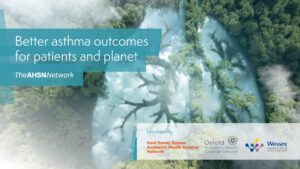On Clean Air Day (15 June 2023) three Academic Health Science Networks (AHSNs) are launching a toolkit to help healthcare professionals working in the respiratory field to benefit patients and reduce the environmental impact of asthma treatments.
The Kent Surrey Sussex (KSS), Oxford and Wessex AHSNs have come together to create a practical guide called ‘Better asthma outcomes for patients and planet‘. It contains helpful information on reducing the carbon footprint of inhalers, optimising effective inhaler prescribing, identifying severe asthma and more.[1]
Amelia James, Environmental Sustainability Lead at KSS and Oxford AHSNs, said: “By empowering clinicians with knowledge of the environmental impact of asthma treatments they will be better armed to transform prescribing practices. That will benefit the entire planet as well as patients.
“The NHS has an opportunity to not only improve the quality of care for individuals but also to demonstrate responsible stewardship of the environment which will benefit everybody. This new toolkit aims to help make this happen.”
Climate change affects everyone, but people living with respiratory conditions are at greater risk. An increase in air pollution linked to rising temperatures is leading to smog becoming a more common phenomenon, irritating the lungs of many, triggering asthma attacks and putting more pressure on respiratory services.
Respiratory care itself has an impact on the environment. When the NHS became the world’s first health system to set ‘net zero’ targets ‘ in 2020[2], one of the focus areas was the use of inhalers. Inhaler emissions account for approximately 3% of the NHS’s carbon footprint (and as high as 13% in primary care). The propellant used in metered dose inhalers (MDIs) accounts for most of this. Yet greener alternative inhalers are available, such as dry powder inhalers (DPIs).
- Find out more and download a copy of Better asthma outcomes for patients and planet
- Read a blog by Amelia James
[1] The resources identified in this document are some of the options available to support respiratory professionals. Other resources may also be available; this list is not exhaustive.
[2] The NHS has set two net zero targets. For emissions the NHS controls directly, their target is 2040. For emissions the NHS can only influence, but not control, their target is 2045.


